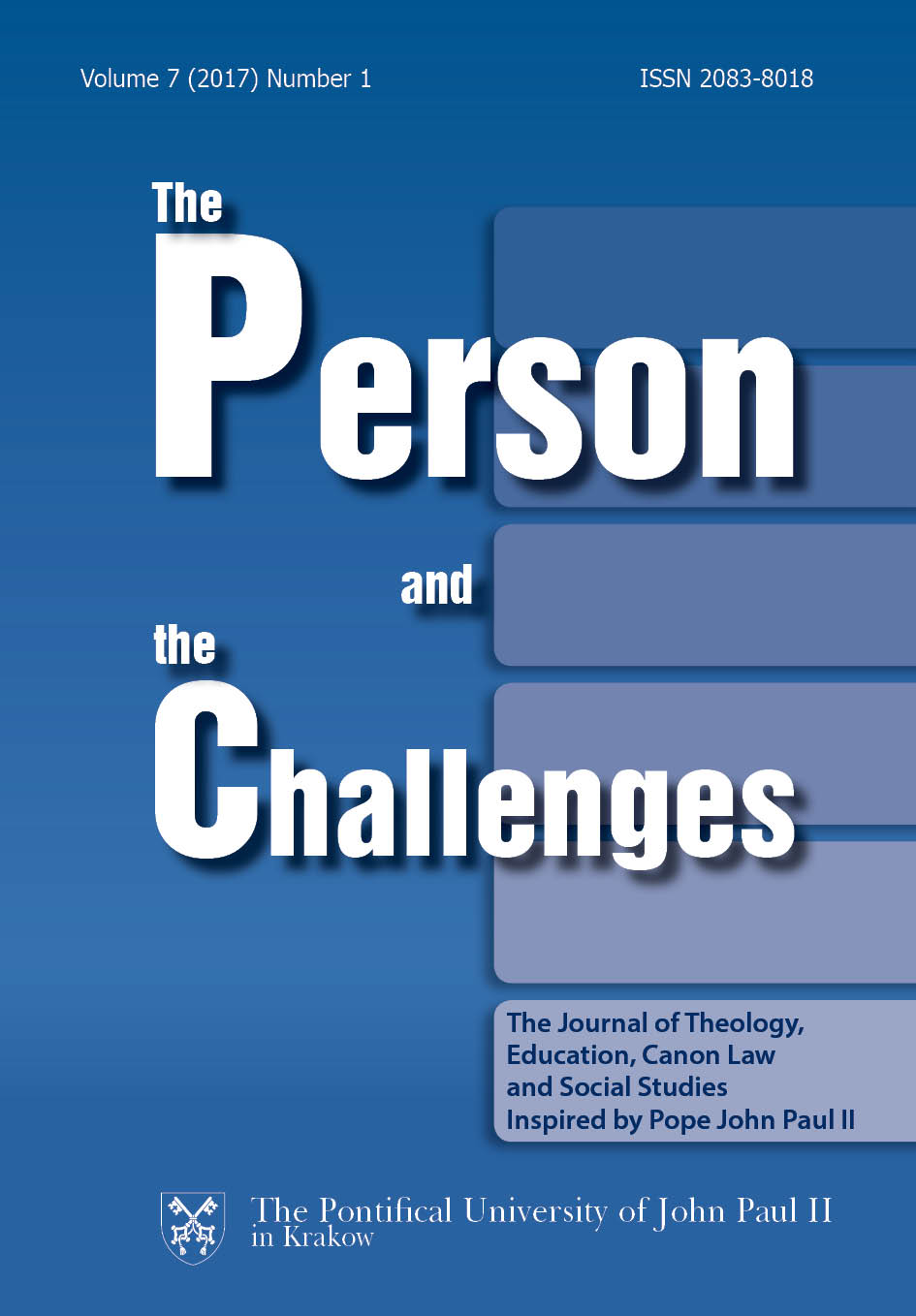Theological Concept of the Fourth Gospel in the Context of Jesus’ Glorification Prayer (Jn 17:1-5)
DOI:
https://doi.org/10.15633/pch.1990Słowa kluczowe:
Glorification prayer, Johannine theology, eschatologyAbstrakt
The analysis of Jn 17:1-5 in its textual, literary, exegetical and theological dimensions shows the importance of Jesus’ prayer to His Father. The prayer of glorification includes a deep theological perspective expressed by the connection between the Son and the Father, earth and Heaven, the believers and God. The glorification of the Father in the prayer of the Son obtains its dynamism in the glorification of the Son in the realization of the Hour. The concept of the Johannine Hour reveals its eschatological character which can be fulfilled in the Passion, Death and Resurrection of the Son. The prayer of Jesus opens the Heaven for every person who together with Him can fulfill the will of God. In the glorification of the Father by the Son (earthly glorification) and the Son by the Father (heavenly glorification) the believers obtain eternal life in the Heavenly Love of God.Bibliografia
Attridge H. W., How priestly is the ‘high priestly prayer’ of John 17?, “Catholic Biblical Quarterly” 75 (2013), p. 1–14.
Beasley‑Murray G. R., John, Nashville: Thomas Nelson 1999.
Becker J., Aufbau, Schichtung und theologiegeschichtliche Stellung des Gebetes in Johannes 17, “Zeitschrift für die neutestamentliche Wissenschaft” 60 (1969), p. 209–232.
Bernard J. H., A Critical and Exegetical Commentary on the Gospel According to St. John, vol. 1–2, Edinburgh: T.& T. Clark 1949.
Boismard M.É. – Lamouille, A., L’évangile de Jean, in: Synopse des quatre évangiles en francais, vol. 3, ed. P. Benoit – M. É. Boismard, Paris: Éditions du Cerf 1977.
Brodie T. L., The Gospel according to John. A Literary and Theological Commentary, Oxford: Oxford University Press 1993.
Brown R., The Gospel according to John, vol. 1–2, London: Chapman 1971.
Bultmann R., The Gospel of John, Philadelphia: Westminster Press 1971.
Caron G., Qui sont les Juifs de l’évangile de Jean?, Ottawa: Bellarmin 1997.
De la Potterie I., Oi=da et ginw,skw, “Biblica” 40 (1959), p. 709–725.
Drozd J., Chwała Chrystusa, in: Egzegeza Ewangelii św. Jana, ed. F. Gryglewicz, Lublin: Redakcja Wydawnictw KUL 1992, p. 167–182.
Grelot P., Les Juifs dans l’évangile selon Jean. Enquête historique et réflexion théologique, Paris: Gabalda et Cie Éditeurs 1995.
Gryglewicz F., Modlitwa Arcykapłańska, in: Egzegeza Ewangelii św. Jana, ed. F. Gryglewicz, Lublin: Redakcja Wydawnictw KUL 1992, p. 113–146.
Hera M. P., Christology and discipleship in John 17, Tübingen: Mohr Siebeck 2013.
Käsemann E., Jesu letzter Wille nach Johannes 17, Tübingen: Mohr Siebeck 1971.
Kuśmirek A., Żydzi w Ewangelii Jana, “Studia Theologica Varsaviensia” 30 (1992), p. 121–135.
Lagrange M.-J. Évangile selon Saint Jean, Paris: Gabalda et Cie Éditeurs 1925.
Langkammer H., Pieśń o Logosie, in: Egzegeza Ewangelii św. Jana, ed. F. Gryglewicz, Lublin: Redakcja Wydawnictw KUL 1992, p. 9–26.
Léon‑Dufour X., Lecture de l’évangile selon Jean, vol. 1–4, Paris: Éditions du Seuil 1988–1996.
Manns F., L’Évangile de Jean à la lumière du Judaïsme, Jerusalem: Franciscan Printing Press 1991, p. 383–400.
Marchel W., Ojciec, in: Egzegeza Ewangelii św. Jana, ed. F. Gryglewicz, Lublin: Redakcja Wydawnictw KUL 1992, p. 147–156.
Mędala S., Funkcja chrystologiczno‑eklezjologiczna dialogów Jezusa z Żydami w czwartej Ewangelii, in: Studia z biblistyki, vol. 4, Warszawa: Akademia Teologii Katolickiej 1984.
Mędala S., Świat, in: Egzegeza Ewangelii św. Jana, ed. F. Gryglewicz, Lublin: Redakcja Wydawnictw KUL 1992, p. 347–368.
Mędala S., Funkcja ‘Żydów’ w Ewangelii św. Jana, “Collectanea Theologica” 64 (1994), p. 79–101.
Morgenthaler R., Statistik des Neutestamentlichen Wortschatzes, Zürich: Gotthelf Verlag 1973.
Schnackenburg R., Strukturanalyse von Joh 17, “Biblische Zeitschrift” 17 (1973), p. 67–78.
Schanckenburg R., The Gospel according to St. John, vol. 1–3, London: Burns and Oates 1982.
Stachowiak L., Modlitwa arcykapłańska (J 17). Refleksja egzegetyczna, “Roczniki Teologiczno‑Kanoniczne” 21 (1974), p. 85–94.
Szefler P., Żydzi, in: Egzegeza Ewangelii św. Jana, ed. F. Gryglewicz, Lublin: Redakcja Wydawnictw KUL 1992, p. 337–346.
Tolmie D. F., Jesus’ Farewell to the Disciples: John 13:1-17:26 in Narratological Perspective, Leiden: Brill 1995.
Von Vahlde U. C., ‘The Jews’ in the Gospel of John: Fifteen years of Research (1983–1998), “Ephemerides theologicae Lovanienses” 76 (2000), p. 30–55.
Wróbel M. S., Władza w Ewangelii św. Jana, “Verbum Vitae“ 14 (2008), p. 135–152.
Wróbel M. S., ‘Żydzi’ Janowi jako klucz interpretacyjny w głębszym rozumieniu historii i teologii czwartej Ewangelii, in: Żydzi i judaizm we współczesnych badaniach polskich, ed. K. Pilarczyk, Kraków: Antykwa 2010, p. 47–61.
Pobrania
Opublikowane
Numer
Dział
Licencja
Prawa autorskie (c) 2017 Mirosław S. Wróbel

Utwór dostępny jest na licencji Creative Commons Uznanie autorstwa 4.0 Międzynarodowe.
Autorzy publikujący w czasopiśmie udzielają jego wydawcy zgody o następującej treści:
- Autor zachowuje autorskie prawa majątkowe do utworu, a jednocześnie udziela wydawcy czasopisma zgody na jego pierwszą publikację w wersji drukowanej i wersji online na licencji Creative Commons Uznanie autorstwa 4.0 Międzynarodowe oraz zgody na wykonywanie opracowań, w tym przekładów.
- Autor ma możliwość udzielania zgody niewyłącznej na opublikowanie utworu w wersji, która ukazała się w czasopiśmie (np. zamieszczenia go w repozytorium instytucjonalnym lub opublikowania w książce), wraz z informacją o jego pierwszej publikacji w czasopiśmie.
- Autor może umieścić swój utwór online (np. w repozytorium instytucjonalnym lub na swojej stronie internetowej) jeszcze przed zgłoszeniem utworu do czasopisma.

